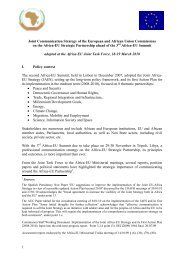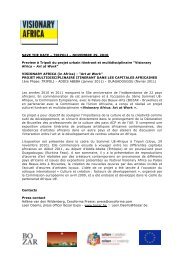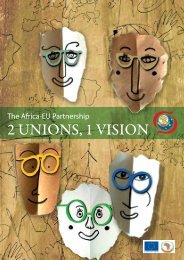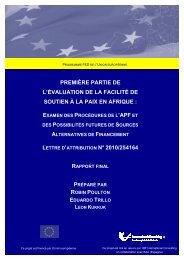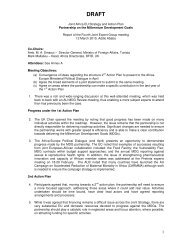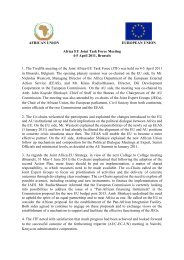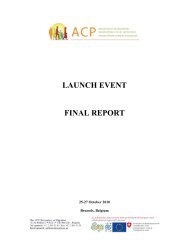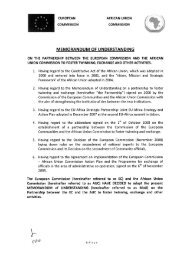part 1 of the african peace facility evaluation - European ...
part 1 of the african peace facility evaluation - European ...
part 1 of the african peace facility evaluation - European ...
Create successful ePaper yourself
Turn your PDF publications into a flip-book with our unique Google optimized e-Paper software.
RECs that might not qualify or for o<strong>the</strong>r actors that can add value to APSA or even o<strong>the</strong>r objectives<br />
within <strong>the</strong> Africa-EU <strong>part</strong>nership on Peace and Security.<br />
BE RESULT-ORIENTED RATHER THAN ACTOR-ORIENTED<br />
The result is what matters so APF strategic focus must be on <strong>the</strong> three objectives <strong>of</strong> <strong>the</strong> Africa-EU<br />
Partnership, namely political dialogue, operationalisation <strong>of</strong> APSA and PSOs. The AU and RECs are<br />
important actors in this context and <strong>the</strong> majority <strong>of</strong> funding should target <strong>the</strong>se intergovernmental<br />
organisations. However, <strong>the</strong> AU and RECs are not <strong>the</strong> only stakeholders or drivers behind politics,<br />
APSA and PSOs. Many o<strong>the</strong>r actors, such as individual African member states, but also civil society<br />
groups, research and training centres, specialised entities, private sector and o<strong>the</strong>r international<br />
organisations should be eligible for funding.<br />
A MANUAL OF APF PROCEDURES IS NEEDED<br />
The <strong>evaluation</strong> recommends <strong>the</strong> elaboration <strong>of</strong> a specific, multilingual manual for all those involved in<br />
APF, containing <strong>the</strong> objectives, actors, rights, duties and controls related to APF activities. It should<br />
be easy to read for everyone and explain in detail how APF works with regard to AU/RECs. This<br />
manual should be a useful tool to facilitate initiatives, implementation and auditing and improve<br />
efficiencies and mutual understandings between EU and AU/RECs. Never<strong>the</strong>less, <strong>the</strong> mutual<br />
absorbing <strong>of</strong> institutional cultures is equally important to build <strong>part</strong>nerships as well as an<br />
understanding <strong>of</strong> why procedures exist and how <strong>the</strong>y work.<br />
III.2.6<br />
AU/REC PROCEDURES AND PRACTICE FOR APF REQUESTS<br />
According to <strong>the</strong> <strong>evaluation</strong> ToR, AU/REC capacity constraints at all levels will be a focus <strong>of</strong> APF<br />
<strong>evaluation</strong> Part 2, in <strong>part</strong>icular in <strong>the</strong> areas <strong>of</strong> administrative and financial management, operational,<br />
planning and long-term capacity building planning. Never<strong>the</strong>less, it is necessary at this stage to make<br />
an assessment <strong>of</strong> <strong>the</strong> current AU/REC procedures and practices pertaining to APF requests.<br />
The political legitimacy <strong>of</strong> APF-funded activities in Africa comes from <strong>the</strong> AU, and for PSOs it also<br />
comes from <strong>the</strong> UN. The AU has <strong>the</strong> very important Peace and Security Council, composed <strong>of</strong> fifteen<br />
elected MS, and <strong>the</strong>ir decisions bear both legal and political weight. Supporting <strong>the</strong> PSC and<br />
increasing its pr<strong>of</strong>ile will benefit <strong>the</strong> institutional capacity <strong>of</strong> AU both from a management point <strong>of</strong> view<br />
(to make <strong>the</strong> PSC function efficiently) and politically because AU MS political will and support for<br />
APSA is not guaranteed, although necessary for APSA success.<br />
Political approval <strong>of</strong> APF requests comes from <strong>the</strong> PSC. Never<strong>the</strong>less, as mentioned above, in less<br />
politically sensitive matters, such as CB or ERM, approval could be delivered by <strong>the</strong> AUC, including<br />
political approval for REC requests. The <strong>evaluation</strong> considers this AU endorsement to be a valuable<br />
step, since it reinforces both <strong>the</strong> institutional architecture <strong>of</strong> APSA and <strong>the</strong> necessary hierarchy to pancontinental<br />
institutions. In practice <strong>the</strong>re is little or no delay caused by political approval, since <strong>the</strong><br />
practical administrative work takes place in parallel inside APF.<br />
The P&S policy should be under <strong>the</strong> overall guidance <strong>of</strong> AU, from where doctrine should emerge. The<br />
principle <strong>of</strong> subsidiarity would reduce <strong>the</strong> risk <strong>of</strong> centralised AUC decision-making hampering APF<br />
implementation. This would require that <strong>the</strong> management <strong>of</strong> P&S be <strong>the</strong> responsibility <strong>of</strong> RECs,<br />
following doctrine established by <strong>the</strong> AU. Certain RECs will always be stronger than o<strong>the</strong>rs (or even<br />
than <strong>the</strong> AU in some fields), but a common doctrine will bring <strong>the</strong>m toge<strong>the</strong>r politically and<br />
philosophically.<br />
Decisions <strong>of</strong> <strong>the</strong> PSC are executed by <strong>the</strong> AUC, and in <strong>part</strong>icular <strong>the</strong> PSD. The PSOD coordinates<br />
and manages PSOs. The PSD should also be providing <strong>the</strong> overall leadership and doctrine to RECs<br />
Page 37 <strong>of</strong> 49




